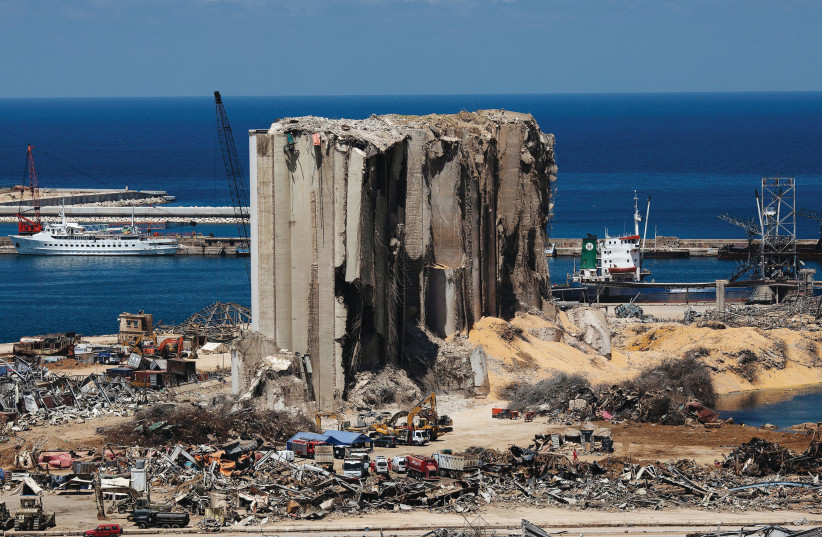Lebanese President Michel Aoun called on Tuesday for a meeting of the country's cabinet, even if it is boycotted by some parties, stressing that the government cannot be held idle as "there are matters that need to be decided on," according to Lebanon's National News Agency.
The statement comes as Lebanon's cabinet has not met for two months due to demands by Hezbollah for Judge Tarek Bitar to be removed from the Beirut Port blast case before they agree to a cabinet meeting.
After being halted for a month, Bitar resumed his investigation into the Beirut port blast earlier this month after the Beirut Court of Appeals rejected an appeal by former Public Works Minister Youssef Fenianos, who had been charged and summoned for questioning by Bitar.
"I support the call to hold a cabinet session even if it is boycotted, and we are faced with the necessity of choosing between politics and the judiciary, so who will prevail? Representative or judicial? In Lebanon, there are 3 separate authorities: executive, legislative and judicial, and no authority can interfere in the work of the other," said Aoun.
Aoun stressed that he has called for the constitution to be respected and for judicial matters to be addressed by the relevant authority, saying "there are those who did not accept the judiciary’s statements in this regard."

The president added that "the innocent should not be afraid of the judiciary."
Aoun added that understandings have largely been established with Prime Minister Najib Mikati, even if they don't always agree on everything.
Concerning Hezbollah, Aoun, considered an ally of Hezbollah's, stated that "there are things that must be said between friends, and we advocate what the constitution says, because not respecting it means chaos will prevail."
Countering Aoun's calls, speaker of the parliament Nabih Berri stated on Tuesday that no solution would be reached until Hezbollah's issues concerning Bitar are addressed.
On Wednesday, Berri stated that he was "ready to go up on foot" to the president's residence to meet with Aoun if he feels positive about finding a solution to the crisis. Berri also insisted that the head of the Supreme Judicial Council should have a role in Bitar's case.
On Tuesday, Druze politician Walid Jumblatt expressed outrage at the continued lack of action by the cabinet, warning that "the longer the meeting is delayed, the greater the crisis," according to NNA.
"We will continue to believe in the judiciary above all doubt, and none of us is above the law, so I do not understand these maneuvers or attempts to escape the law," added Jumblatt.
Despite Aoun's claims of understandings being reached with Mikati, the Lebanese Ad-Diyab newspaper reported on Wednesday that the prime minister is still not ready to call a cabinet meeting, despite the worsening economic and humanitarian crisis in Lebanon.
The Lebanese pound hit a historic low on Tuesday, reaching 28,500 Lebanese pounds to the dollar.
According to the newspaper, Mikati is hesitant to call a cabinet meeting due to concerns it could destabilize the country, especially amid "alarming security information" and the security situation possibly being shaken by the shooting against a Hamas funeral in a Palestinian refugee camp on Sunday.
Hezbollah has expressed strong opposition in recent months to Bitar continuing the investigation. The case has been suspended multiple times due to allegations of bias filed by officials who have been charged by the judge.
Lebanon's public prosecutor on Tuesday instructed security forces to arrest Ali Hassan Khalil, a former finance minister, over the Beirut port blast, a senior judicial source said on Tuesday, according to Reuters. Khalil is a right-hand man of Berri's and has been sanctioned by the US for supporting Hezbollah.
The prosecutor instructed security forces to conduct the arrest after January 1, when parliament is out of session. On Friday, Bitar had called on security forces to conduct the arrest for the warrant he had issued in October, warning that they would face prosecution themselves if they refused.
Both implied and explicit threats have been made by Hezbollah and its allies against Bitar in recent months, claiming that the investigation is being influenced by foreign and political pressure.
On Tuesday, Hezbollah deputy secretary-general Naim Qassem claimed that Bitar was targeting Hezbollah and its allies, demanding that the government address the issue immediately.
After deadly clashes broke out during a Hezbollah protest against Bitar in October, Hezbollah Secretary-General Hassan Nasrallah claimed that the movement had been targeted since the first moments after the explosion and warned that it would not remain silent.
Also in October, sources from Hezbollah and the Marada movement told the Lebanese Al-Jadeed TV news that Bitar was preparing to accuse Hezbollah directly of responsibility for the explosion. The sources added that if he is not removed, they will leave the government.
Hezbollah has been blamed for being at least partially responsible for the negligent handling of the weapons-grade ammonium nitrate stored at the port which led to the blast. The owner of the vessel which brought the chemicals to Beirut has been accused of dealing with Hezbollah and the Syrian government, with an FBI probe finding that most of the chemicals had been siphoned away from the port before the time of the blast.
Hezbollah also has a strong hold over Lebanon’s ports, with many relevant officials coming from either the group or its allies. Even if the movement did not purposefully import the ammonium nitrate, it or its allies may still be found responsible for the explosion due to negligence.
